Hey guys, first post here and new to the overland concept. Recently me and my father have been doing a lot of traveling and staying out on the land hunting. Been from Maine, SD, Western PA and going to Nebraska this year. He currently drives a lifted Chevy Express 2500 2wd, but is in the process of getting a 4x4 one. Typically 2 or 3 of us and 2 dogs out for a week and just tenting it with a cooler of ice. My dad decided he wanted to upgrade the van and get solar panels, fridge, and maybe a roof top tent. But both of us starting looking into items and came across 'overlanding.' Amazing I never heard of this before 4 days ago, but I am wonder brands and items people recommend and ones people think I should avoid. Any information would be greatly appreciated. Thanks
Trying to help my dad
- Thread starter kevbo141
- Start date

Member III
Welcome to your newest addiction.
Different off road forums will have a section where people modify their vehicles. These are called build threads. I'm not saying everyone does it correctly but you can get ideas and compare. Gear wise, look for the area with equipment, tents, trailers. With the vans, search out camping or overlanding Chevy Express.
Vehicle builds
Full size
and so on.
Take the time and learn about the items you like. Peoples opinions will differ greatly so make sure you do your research and have fun.
Different off road forums will have a section where people modify their vehicles. These are called build threads. I'm not saying everyone does it correctly but you can get ideas and compare. Gear wise, look for the area with equipment, tents, trailers. With the vans, search out camping or overlanding Chevy Express.
Vehicle builds
Full size
and so on.
Take the time and learn about the items you like. Peoples opinions will differ greatly so make sure you do your research and have fun.
Red_Leaf_Overland
Rank V

Advocate III
I have used smittybilt roof top tents in the past while helping out during 4x4 events with a company I used to work with. Never had any issues and I would say they are probably one of the best bang for the buck tents out there and should be available at just about any 4x4 shop in North America ( they are one of 4 wheel parts house brands). They are the only brand I have used so I will let others chine in with their experiences with them and others.Hey guys, first post here and new to the overland concept. Recently me and my father have been doing a lot of traveling and staying out on the land hunting. Been from Maine, SD, Western PA and going to Nebraska this year. He currently drives a lifted Chevy Express 2500 2wd, but is in the process of getting a 4x4 one. Typically 2 or 3 of us and 2 dogs out for a week and just tenting it with a cooler of ice. My dad decided he wanted to upgrade the van and get solar panels, fridge, and maybe a roof top tent. But both of us starting looking into items and came across 'overlanding.' Amazing I never heard of this before 4 days ago, but I am wonder brands and items people recommend and ones people think I should avoid. Any information would be greatly appreciated. Thanks
One thing I found is that I really don't like sleeping on the roof of a vehicle or trailer. Getting in and out of the tents feels clumsy and on dewy mornings it can be easy to find yourself at the bottom of the ladder quicker than expected lol. See if you can find someone who has one and is willing to let you climb in and out to see how it feels.
Where is Road?
Of all the advice you are likely to get, pay close attention to his. He knows what it is to travel off road in a Chevy Express.
Of all the advice you are likely to get, pay close attention to his. He knows what it is to travel off road in a Chevy Express.

Advocate III
.Hey guys, first post here and new to the overland concept. Recently me and my father have been doing a lot of traveling and staying out on the land hunting. Been from Maine, SD, Western PA and going to Nebraska this year. He currently drives a lifted Chevy Express 2500 2wd, but is in the process of getting a 4x4 one. Typically 2 or 3 of us and 2 dogs out for a week and just tenting it with a cooler of ice. My dad decided he wanted to upgrade the van and get solar panels, fridge, and maybe a roof top tent. But both of us starting looking into items and came across 'overlanding.' Amazing I never heard of this before 4 days ago, but I am wonder brands and items people recommend and ones people think I should avoid. Any information would be greatly appreciated. Thanks
.Where is Road?
Of all the advice you are likely to get, pay close attention to his. He knows what it is to travel off road in a Chevy Express.
Hey thanks, @Anak! I appreciate your confidence in my experience with vans.
@kevbo141 - Welcome to the madness!
For most of us, overlanding is just a more kitted out version of what you and your father have been doing for years; depending on vehicles to carry gear and get us places where we'd like to camp and explore more. Some are out primarily to do trails and test their vehicle's capabilities and compare results with others. Others are out more to camp and explore an area's history, culture, and people. And some are out for varying degrees of both.
I've used a variety of vehicles for adventuring around North America, from VW bugs and a Chevy Suburban Carryall in the 70s to Chevy and Dodge pickups with caps, to settling on a succession of vans. For me, vans allow a greater flexibility in long-term travel.
I explain my style of adventuring in this post; in the thread "What Kind of Overlanding Do You Do?" There are several posts from others there that explain their style. There's no one right, or best, way.
I've had My current van about ten years. It is a long wheelbase GMC Savana (same as Chevy Express). It is rear-wheel drive; a 2500 with parts upgraded to 3500 by Penske before I bought it; and is powered by a 6.6 Duramax diesel. Mine is not lifted at all, though I've thought about it.
I've used it to go all over, from the north side of the St Lawrence Seaway in French-speaking Quebec to running the entire Mexican border on as many remote back country roads as I can find and am allowed, and from the Pacific Northwest through the Great Plains to the mountain forests of east Tennessee and the swamps & bayous of Louisiana and ocean shores in Texas around the Gulf of Mexico.
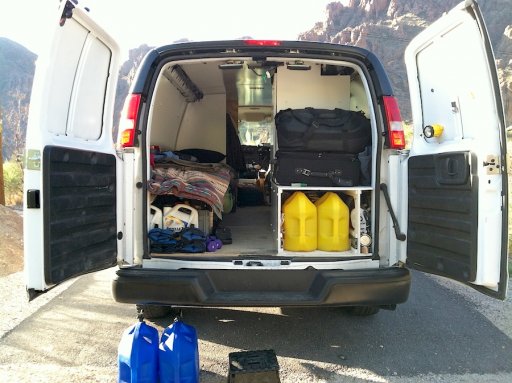
I keep this van fairly flexible in arrangement, from the 2012 layout above with a bed down each side and removable cupboard storage, to a more open style like below. . .
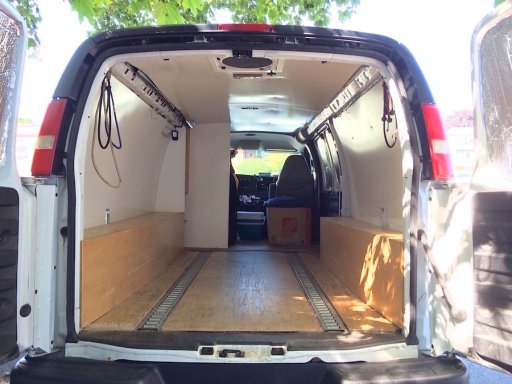
with side cabinets down each side that widen to 56" at the rear doors and taper inward to 51" between wheel wells. They go back 8' on one side and to the side doors on the other. The widening at the rear doors keeps the ends of the cabinets from being dinged when I load and helps center loads like full-sized sheet goods, etc.
The side cabinets are sized to a comfortable sitting height so I can put folding bedboards down each side or anywhere across the width, like below:
..
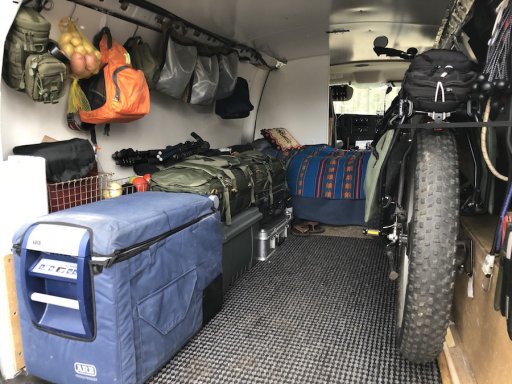
This arrangement still provides about three feet the other side of the half-bulkhead behind the front seats. This is the way I travel most of late.
For the last 3.5 yrs I've used my van to tow a very capable off-road trailer with a large cargo bed and a GVW of 3500#.
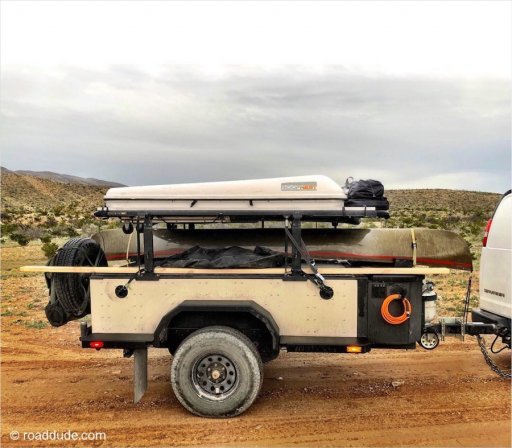
...
The trailer unpacks and folds out easily into this (refresh this post if the below image is not animated):
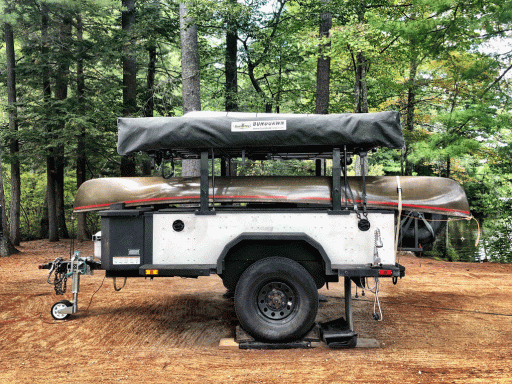
and still has a cargo bed that is available for a vast amount of gear, even when set up, for extended all weather adventures:
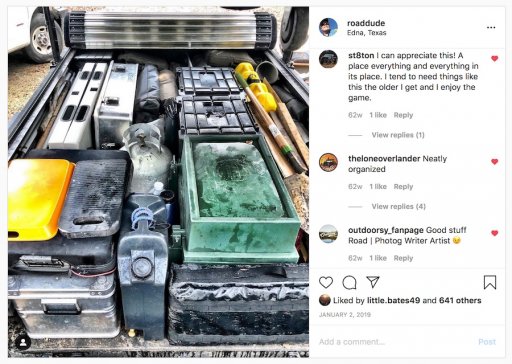
Having a trailer does several things for me:
- Provides a platform on which to add elements that make my style of wandering and camping more comfortable while leaving the van to be less-packed and more flexible for both camping and daily-driver life.
For me those elements are:
- rooftop tent
- expansive awning
- large outdoor kitchen/work area w/running hot/cold water
- 22gal water storage
- power center with deep cycle batteries fed by either solar, 110 shore power, or gas/propane generator
- Lets me set up a base camp with the above elements, whether for a single night or several weeks. This means I don't have to pack up camp every time I run for supplies or want to explore an area, and that when I get back, everything is all set up and ready to use.- Provides a large cargo area I can use for other things than just adventure gear, like hauling off-grid building supplies or other heavy items/materials.
- I can leave the trailer packed and ready between adventures, which means far less deciding on gear, packing, and arranging.
All that said, I'm re-configuring my van this year to be more stand-alone and self-contained when I want for closer-to home adventures around New England and the Maritime provinces and for shorter photography jaunts where I won't need the trailer. I'm replicating the simple solar setup I have on the trailer so the van has it's own 'house' power, and will add a simple 10gal water supply to the van with 12v pump and faucet.
All of which means I will have even more versatility when adventuring.
ROOFTOP TENT: I don't know that I'd add a rooftop tent to a van, especially if the van is already lifted. It will be a lot more difficult to set up and pack back away at van roof height, and to climb up into and out of, than it would be on a pickup platform or car top. Longer ladder to store, etc. You don't see many rooftop tents on vans for good reason.
If you and your father are set on a rooftop tent for the van, I'd do some serious research into the differences between hard shell pop ups and a soft-sided fold outs. A hard shell popup will be much easier to deploy and pack at that height. All mine takes is to undo four latches, give it a shove, and it's up.
A lot of the rooftop tents sold by vendors these days, like a lot of other outdoor products, are made in the same couple factories and private labeled. Often very similar to one another in style and material.
I'm designing a raised roof for my van with pop-top that will mimic in action the hard shell on my trailer, though longer, and accessible from inside the van. It will allow more headroom inside the van when closed, and provide full stand up height inside the van when open, which can then be easily converted to a 78" long raised sleeping platform, while leaving an always open 30" stand up and bed access area at the sink near the rear doors.
BRANDS & PRODUCTS: I'm a firm believer in purchasing the best you can afford and not going for the cheaper brands because they're cheaper. You'll hear and read the phrase "buy once, cry once" a lot on adventure forums; meaning if pay for the good stuff you won't be replacing it and costing yourself more in the long run.
Fridges are a good example. Less expensive 12v fridges often consume more power and can be louder and less efficient in operation. I love my ARB 50 and have used it regularly in all sorts of climates and environments for almost four years. It gets abused and ignored and is still working as well now as when new. Engel and Dometic are other good solid names. I can't vouch, personally, for a lot of the newer ones on the scene, though they may be good units, too.
Solar panels, solar charge controllers, and deep cycles are another. Not all panels, solar accessories, or batteries are created equal. Even well-known solar panel vendors will source the cells they use from different mfgs, and the panels they sell one year may be different than the panels they sell the next. I like this page when comparing solar cell mfgs: Most Efficient Solar Panels. The 120w folding panel I have uses SunPower Maxeon cells--the most efficient on the market--though was sold by a company who did not manufacture them and no longer sells a folding model. I like it so much, and it works so well, I put the word out I was looking for a used one from that same run to put on my van. I keep it on top of my rooftop tent when underway or parked in a drive, working away at keeping batteries topped off. Then take it off the hard shell and move it about when camping for maximum gain.
Cases and containers are another example. The more you adventure and the more organized and efficient you strive to be, the more you see the advantage of better cases and containers.
For general gear and kitchen stuff, I tend to go smaller, light-weight, flat-sided, stackable, and similarly-sized like the Front Runner Wolf Packs, Cub Packs, and Flat Packs and have gotten away from larger, slant-sided, or double-walled containers like Sterilite, Plano and Pelicans. I do still keep photography gear and electronics in Pelicans, though. I also LOVE my aluminum Zarges Cases; I have three in two sizes that are certified Bear-Resistant by the Interagency Grizzly Bear Committee: IGBC Bear Resistant Products.
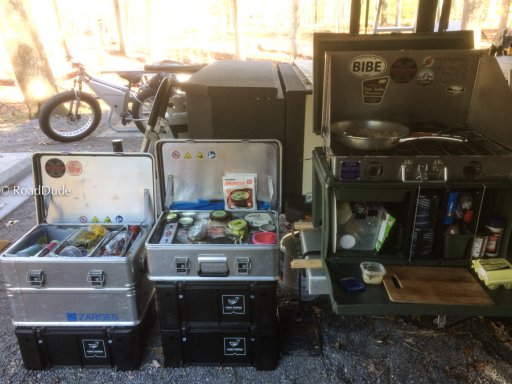
Zarges and FRO Wolf Packs in a kitchen set up in which I cooked a full Thanksgiving meal for three.
Stoves are another item that can vary widely. I love to cook and experiment with a wide range of recipes, so love my rugged and durable Partner 22" (above) and Partner Griddle. You'll find others who love their Camp Chef stoves, whether Mountaineer or the Everest, or their Colemans. I use a Gas One Dual Fuel single burner, too, for a third burner when needed or for back van door table cooking at quick-stops.
*** My best advice to anyone starting to kit out their vehicles is to start easy and light; don't go buying all the geegaws and doodads because everyone else has them. I bought a lot of it and ended up selling a lot of it because I just didn't use it. I thought I would need it all, but I haven't. I kept what I use; traction boards (I have both MaxTrax and Traction Jack and love both styles), weBoost cell booster, the various gear I've mentioned above, etc and sold off the rest.
A lot of how you outfit your vehicle will depend on how often you head out, how long you are gone, and how many different environments you are likely to encounter. Some guys never cold camp and others never desert camp, so their needs will differ greatly from each other.
I tend to head out with no definite return date in mind. I sometimes stay out several weeks and sometimes stay out several months, often going 10,000 or 20,000 miles through different seasons and various climates. I love experimenting with different off-grid set ups, too; comparing gear, trying out this foot print or that for under-canopy space; seeing how long I can stretch my water and food supplies; how little waste I can generate, etc.and how much I can learn about an area, its plant and animal life, and its geology and history. I just geek out on it all and am happiest when I'm out testing my own limits and knowledge.
That means I carry more gear than many, because I want to stay back country longer and may experience more weather scenarios in a single trip; from blistering desert heat to hot and humid swamp lands to below freezing mountain nights before I'm back to re-gear.
Pays to shop around when puying gear, too, and see who is offering what deals, if the deal is really a deal or not, and what their shipping charges are. Sometimes you'll pay a couple more bucks per item from one vendor but get free shipping on orders over $100, which then makes them the least expensive. There's also a ton of great like-new and barely used gear for sale, too. I bought my rooftop tent used (it had only been used on one father-son trip) for about half price. I bought eleven Pelican 1510 cases once, used, and kept a few and sold the rest at half price of new. The deals are out there. Helps when you can travel to get them.
As for other advice and suggestions, find the members here and on other adventure forums whose views and experience you appreciate. Then, depending hover over their name or check their profile and click on "messages" and "content" to see what they've posted here and there as far as gear, advice, questions, and suggestions. There's a ton of experience and wide array of opinions online--some more vaild than others--and some of it is bound to resonate and apply to your particular situations as they arise.
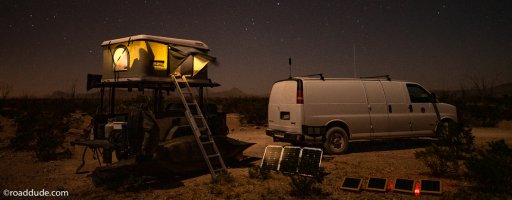
.
Good luck with getting outfitted, and let me know if I can be of help in any way. You're lucky to be adventuring with your Dad.
Hope to meet you out here on the road sometime.
.
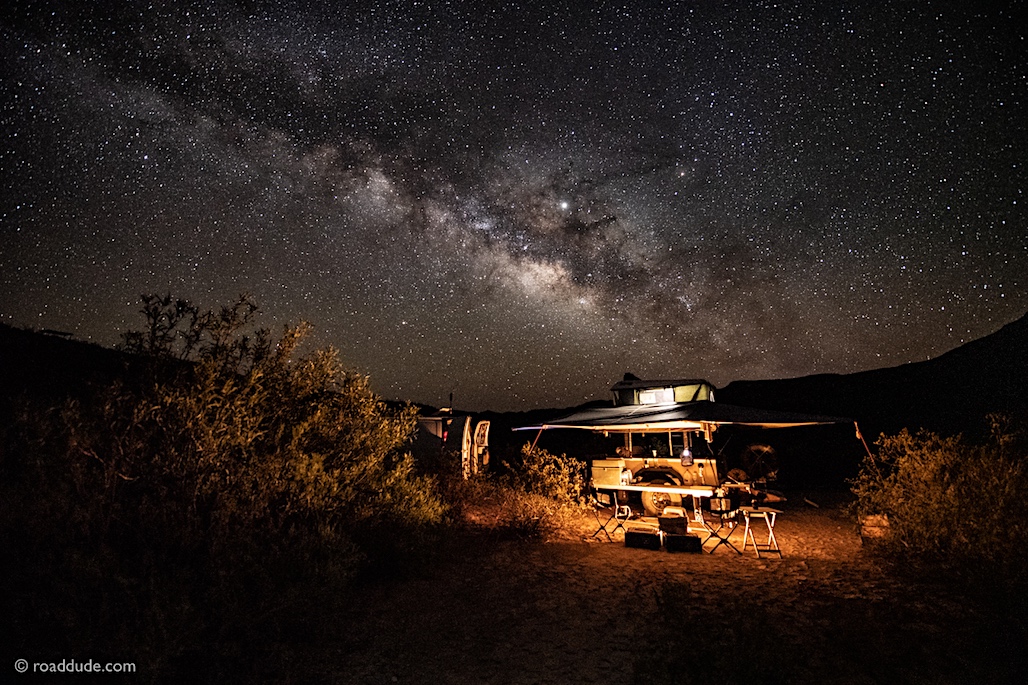
Roaddude - On the Road In North America - ROADDUDE
Roaddude - Traveling Photographer/Writer/Artist On the Road In North America. Gear, reviews, people, places, and culture.
 roaddude.com
roaddude.com
Last edited:
Thanks. Will do. Seems like this place has a lot of places to learn from. Definitely will have to start a lot of research now
Thanks. I never really thought about that. I can definitely see that being a problem. I will reach out to some people to see if can try there’s.

